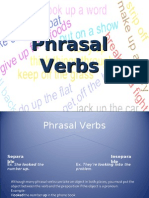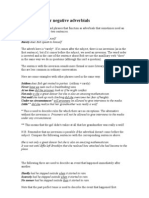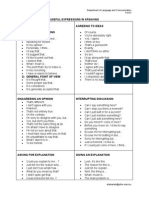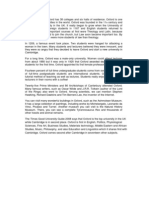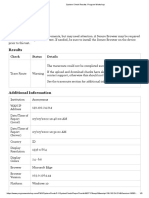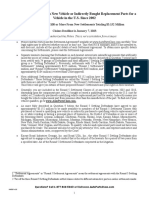Unreal Tenses and Subjunctives
Unreal Tenses and Subjunctives
Uploaded by
BMWuBCopyright:
Available Formats
Unreal Tenses and Subjunctives
Unreal Tenses and Subjunctives
Uploaded by
BMWuBOriginal Description:
Copyright
Available Formats
Share this document
Did you find this document useful?
Is this content inappropriate?
Copyright:
Available Formats
Unreal Tenses and Subjunctives
Unreal Tenses and Subjunctives
Uploaded by
BMWuBCopyright:
Available Formats
UNREAL TENSES AND SUBJUNCTIVES
WISHES wish + past simple/ past continuous This structure is used when we want to say that we would like something to be different in the present. e.g. I wish I had a car. (I dont have one now.) I wish you werent leaving. (You are leaving.) I wish I was going on holiday with you. (I am not going.) wish + past perfect This structure is used to express regret that something happened or did not happen in the past. e.g. I wish I hadnt eaten so much last night.(I ate too much.) wish + would/ could This structure is used: o for a polite imperative; o to express our desire for change in a situation or someones behavior. e.g. I wish you would leave. (would here means I decided to) I wish I could come on holiday with you next year. (I cant come.) I wish we could have been together. (We werent together.) I wish you wouldnt make such a mess. (would is often used to describe an annoying habit)
IF ONLY If only is used to add emphasis on hypothetical situations or to add the sense of regret (in past events). e.g. If only I had enough time! (I dont have enough time) If only I hadnt drunk too much! (I drank too much) HOPE hope + present or future tense This structure is used to expresses simple future events. e.g. I hope it doesnt rain tomorrow. I hope he will stop talking soon!
ITS TIME/ ITS HIGH TIME/ ITS ABOUT TIME Its time + past simple/ past continuous e.g. Its time we left. Its high time I was/were going. Its time + infinitive e.g. Its time to start work. (As a simple statement of fact.) Its time you started work! (You are being lazy and not working.)
HAD BETTER had better + bare infinitive This structure is used to: o give advice or to say what the best thing to do in a particular situation is. e.g. You had better book tour flight early. I had better not take out a loan; I wont be able to pay it back. Had better is more emphatic than should/ ought to, but it is not as emphatic as must. e.g. You must see a lawyer. (strong advice) You had better see a lawyer. (less emphatic than must) You should/ ought to see a lawyer. (less emphatic than had better)
WOULD RATHER/ WOULD SOONER When the subject of would rather/ sooner is also the subject of the following verb, we use the following construction: would rather + present bare infinitive (for future) e.g. Id rather do my shopping tomorrow. would rather + perfect bare infinitive (for past) e.g. Id rather not have gone to the dinner party last night. would rather + bare infinitive + than (+ bare infinitive) e.g. Id rather watch a comedy than (watch) a thriller. When the subject of would rather is different from the subject of the following verb, we use the following constructions: would rather + past tense (for present or future) e.g. Id rather Kate stayed with us tonight. would rather + past perfect (for past) e.g. Id rather Sam hadnt taken his fathers car yesterday. (WOULD) PREFER prefer + ing form + to + ing form (for general preference) e.g. I prefer playing tennis to playing squash. prefer + full infinitive + rather than + bare infinitive (for general preference) e.g. I prefer to eat fish rather than (eat)meat. prefer + noun + to + noun (for general preference) e.g. I prefer basketball to football. would prefer + full infinitive + rather than + bare infinitive (for specific preference) e.g. Id prefer to walk home rather than take bus. Id prefer to have juice rather than (have) Coke.
AS IF/ AS THOUGH When the situation is true we use the following construction: present tense + as if + present tense (future likely situation) e.g. It looks as if it is going to rain. It looks as if it is raining. present tense + as if + present perfect (present likely situation) e.g. He looks as if he hasnt slept enough. past tense + as if + past perfect (past likely situation) e.g. He looked as if he hadnt slept enough. When the situation is unreal we use the following construction: present tense + as if + past simple (present unlikely situation) e.g. He acts as if he was/ were a boss. (but he isnt) present tense + as if + past perfect (past unlikely situation) e.g. You look as if you had seen a ghost. (but he/ she didnt) SUPPOSE/ IMAGINE likely situation e.g. Imagine it rains lather, what will you do? unlikely situation e.g. Imagine we won a lot of money, what would we do? Supposing we had never met. Suppose someone told you I was a spy!
IF/ WHETHER/ WHATEVER e.g. If/ Whether he (should) agree/agrees or not, we are going to have to go ahead. Whatever his reasons be/are, they are insufficient to excuse him.
FORMAL SUBJUNCTIVES After verbs such as demand, insist, suggest, require, request, order recommend, propose, think which involve an implied obligation, the subjunctive can be used in formal style. This has only the infinitive form. e.g. I suggest that you should study harder. (informal) I suggest you study harder. (formal) The police insisted that the car should be removed.(informal) The police insisted the car be removed. (formal) They demand that he should study harder. (informal) They demand he study/ studies hard. (formal) After expressions such as it is advisable/necessary/essential/important/desirable/preferable/ urgent that e.g. It is urgent that he should do it immediately. (informal) It is urgent he do it immediately. (formal) FORMALIC SUBJUNCTIVES God save the Queen! Heaven help us! Heaven forbid! Curse this fog! So be it. Be that as it may Suffice it to say Far it be from me Come what may
You might also like
- Freelance Graphic Designer Contract TemplateDocument3 pagesFreelance Graphic Designer Contract TemplateEdgard Figuracion Salo100% (1)
- Cae Adverb Adjective CollocationsDocument5 pagesCae Adverb Adjective CollocationsXantal Garcia100% (1)
- SPG BallotDocument4 pagesSPG BallotLeonorBagnison58% (12)
- Future FormsDocument2 pagesFuture FormsNatasha Samoylova50% (2)
- REVISION: FUTURE TENSES (Will, Going To and Present Continuous)Document4 pagesREVISION: FUTURE TENSES (Will, Going To and Present Continuous)Mariana Gisele TisonNo ratings yet
- Writing Reference PET ExamDocument3 pagesWriting Reference PET ExamRita BrestovskaNo ratings yet
- Basic Difference Between DO and MAKEDocument4 pagesBasic Difference Between DO and MAKELenaps100% (1)
- Biography Abraham LincolnDocument3 pagesBiography Abraham LincolnJavier Alvarez Alonso75% (4)
- Work Book, Income Statement, Balance Sheet (Page-13-15)Document3 pagesWork Book, Income Statement, Balance Sheet (Page-13-15)Greeni Marco100% (2)
- Mixed ConditionalsDocument6 pagesMixed ConditionalsKarina FernandesNo ratings yet
- ConditionalsDocument4 pagesConditionalsralucaNo ratings yet
- Unreal Past TensesDocument2 pagesUnreal Past TensesAsmir Doric100% (2)
- FCE PART 1useful Expressions and Vocabulary For CAE and FCE Speaking Part 1Document13 pagesFCE PART 1useful Expressions and Vocabulary For CAE and FCE Speaking Part 1mariamcarullaNo ratings yet
- Grammarism Ed Ing Adjectives Test 4 1189424Document2 pagesGrammarism Ed Ing Adjectives Test 4 1189424Royal Stars Drama AcademyNo ratings yet
- 3 Key-Word-Transformation PDFDocument2 pages3 Key-Word-Transformation PDFPatricia CopelloNo ratings yet
- Countable and Uncountable Nouns, Ver 2Document3 pagesCountable and Uncountable Nouns, Ver 2Stefan ZammitNo ratings yet
- Make Questions 11 99876Document1 pageMake Questions 11 99876McMillan100% (1)
- FCE WritingDocument87 pagesFCE WritingS MBNo ratings yet
- Reported Speech TheoryDocument4 pagesReported Speech TheoryanabelvilchesNo ratings yet
- The Many Meanings of Get (ESL Grammar Handout)Document4 pagesThe Many Meanings of Get (ESL Grammar Handout)Lions At The DoorNo ratings yet
- Wish - If Only - It S Time - Would Rather PDFDocument2 pagesWish - If Only - It S Time - Would Rather PDFamgiuntaNo ratings yet
- Conditionals Wishes Unreal PastDocument2 pagesConditionals Wishes Unreal PastTra Giang100% (1)
- Mixed Conditionals ExerciseDocument4 pagesMixed Conditionals ExerciseDhe LandichoNo ratings yet
- What Is The Passive Voice?Document14 pagesWhat Is The Passive Voice?Luis Felipe Aquino QuianeNo ratings yet
- Passive Voice Songs PDFDocument1 pagePassive Voice Songs PDFZyanyaHernandezPeredaNo ratings yet
- Mixed Conditionals 2Document2 pagesMixed Conditionals 2Elena MartínNo ratings yet
- Inversions B2 Extra PracticeDocument2 pagesInversions B2 Extra PracticeKharina Montero100% (1)
- Participle ClausesDocument3 pagesParticiple ClausesDaniela KreberNo ratings yet
- Inversion ExercisesDocument4 pagesInversion ExercisesVivien GonzalezNo ratings yet
- Impersonal PassiveDocument15 pagesImpersonal PassiveMarta Marques100% (1)
- Phrasal Verb - For Gifted StudentsDocument4 pagesPhrasal Verb - For Gifted StudentsNam Phong Nguyen HuuNo ratings yet
- Past Tenses and Present Perfect 1 - 108801Document2 pagesPast Tenses and Present Perfect 1 - 108801L.No ratings yet
- Phrasal VerbsDocument5 pagesPhrasal VerbsIC1050% (2)
- Mixed Conditionals, Form and ExerciseDocument1 pageMixed Conditionals, Form and ExerciseMara'sBanksNo ratings yet
- WishDocument2 pagesWishngoctanbianNo ratings yet
- ADJ AND SUFFIX First Certificate English - Word FormationDocument2 pagesADJ AND SUFFIX First Certificate English - Word FormationIkebamaNo ratings yet
- FCE Comparing and ContrastingDocument2 pagesFCE Comparing and ContrastingStephanie MezykNo ratings yet
- Future in The PastDocument6 pagesFuture in The PastGaukhar ZeinetullaNo ratings yet
- I Wish If Only British English Student Ver2Document4 pagesI Wish If Only British English Student Ver2khatiraNo ratings yet
- Negative Adverbials: - InversionDocument4 pagesNegative Adverbials: - Inversionbhpo100% (1)
- Conditional Exercises MixedDocument2 pagesConditional Exercises MixedmarhulNo ratings yet
- In Versions After Negative AdverbialsDocument2 pagesIn Versions After Negative Adverbialscrisrolo253832100% (2)
- E Cpe Focus On GrammarDocument2 pagesE Cpe Focus On GrammarantigonivolNo ratings yet
- First Conditional: A Real Possibility in The Future: IF Condition Result Present Simple WILL + Base VerbDocument2 pagesFirst Conditional: A Real Possibility in The Future: IF Condition Result Present Simple WILL + Base VerblonglongfruNo ratings yet
- Future Tenses CompleteDocument9 pagesFuture Tenses CompleteLAURANo ratings yet
- CAE Speaking Phrases: Likes/dislikes OpinionDocument2 pagesCAE Speaking Phrases: Likes/dislikes OpinionLucia GrippoNo ratings yet
- Wish + Subject + Past, Past Perfect or ConditionalDocument1 pageWish + Subject + Past, Past Perfect or ConditionalMaria MontesNo ratings yet
- Reporting VerbsDocument2 pagesReporting VerbsChue Sandi Woon Sett100% (2)
- Giving Answers: Fce - Useful Language For Speaking Elia García CalvoDocument1 pageGiving Answers: Fce - Useful Language For Speaking Elia García CalvoEly A G Bald100% (1)
- How To Describe Pictures in EnglishDocument1 pageHow To Describe Pictures in EnglishMari PalaciosNo ratings yet
- Useful Expressions in SpeakingDocument4 pagesUseful Expressions in SpeakingDex JHNo ratings yet
- PET EXAM Guide To TransformationsDocument3 pagesPET EXAM Guide To TransformationsPedro Marchante ChichonNo ratings yet
- PET Writing Useful PhrasesDocument4 pagesPET Writing Useful PhrasesGregorioMoroNo ratings yet
- Grammar About Let, Be Allowed To, MakeDocument4 pagesGrammar About Let, Be Allowed To, MakeArjuna D'ChenNo ratings yet
- I Wish Theory and Exercises With KeyDocument4 pagesI Wish Theory and Exercises With KeyBeatriz FelipeNo ratings yet
- If Clause Type 1Document13 pagesIf Clause Type 1Sofiyah Binti SaibuNo ratings yet
- Inversions When Do We Use Inversion?: NeverDocument2 pagesInversions When Do We Use Inversion?: NevercalookaNo ratings yet
- Comparison ExercisesDocument17 pagesComparison ExercisesnguyenngocquynhchiNo ratings yet
- Irregular Verbs in The Past Simple TenseDocument4 pagesIrregular Verbs in The Past Simple TenseRobin Millan0% (1)
- Mixed Tense Revision 2 PDFDocument2 pagesMixed Tense Revision 2 PDFAnabela GuedesNo ratings yet
- Paraphrases Tenses MRDocument2 pagesParaphrases Tenses MRAnna Prokop100% (1)
- English Grammar Exercises by Difficulty: Book 3From EverandEnglish Grammar Exercises by Difficulty: Book 3Rating: 5 out of 5 stars5/5 (1)
- Unreal Tenses and SubjunctivesDocument3 pagesUnreal Tenses and SubjunctivesBình LươngNo ratings yet
- Unreal Past 1Document4 pagesUnreal Past 1gdydj2wrjtNo ratings yet
- PrepositionsDocument4 pagesPrepositionsBMWuBNo ratings yet
- The Man Who Made FemenDocument2 pagesThe Man Who Made FemenBMWuBNo ratings yet
- Indefinite or Definite ArticleDocument4 pagesIndefinite or Definite ArticleBMWuBNo ratings yet
- Oxford UniversityDocument1 pageOxford UniversityBMWuBNo ratings yet
- Bills PerformaDocument2 pagesBills Performamuhammad muneebNo ratings yet
- Omdc ArDocument172 pagesOmdc ArArun Kumar N VNo ratings yet
- TDS Challan Nov 15Document243 pagesTDS Challan Nov 15sunilNo ratings yet
- AML Consultant Job Description - UAEDocument1 pageAML Consultant Job Description - UAESathishNo ratings yet
- Commercial Paper & Secured TransactionsDocument12 pagesCommercial Paper & Secured Transactionscatherine6claire100% (1)
- Central Surety Vs PlantersDocument2 pagesCentral Surety Vs PlantersJL A H-DimaculanganNo ratings yet
- 3.7 Strategic Financial Management (Old Syllabus) of ACCA Past Papers With Answers From2002-2006Document11 pages3.7 Strategic Financial Management (Old Syllabus) of ACCA Past Papers With Answers From2002-2006Sajid Ali100% (1)
- System Check Results - Program WorkshopDocument3 pagesSystem Check Results - Program Workshopubaya tasNo ratings yet
- BookDocument542 pagesBookKyaw Zaw LinNo ratings yet
- Sy0-701 4Document31 pagesSy0-701 4pipino2006No ratings yet
- Clapham - Degrees of StatehoodDocument16 pagesClapham - Degrees of Statehoodirina_lamadridNo ratings yet
- Chipongian Vs BenitezDocument3 pagesChipongian Vs BenitezcarinokatrinaNo ratings yet
- NWB-Pricelist-02 12 21Document2 pagesNWB-Pricelist-02 12 21SakthivelNo ratings yet
- Consumer Rights and Awareness ProjectDocument8 pagesConsumer Rights and Awareness ProjectAashrita Panathula100% (1)
- ACICA Sample Notice of ArbitrationDocument8 pagesACICA Sample Notice of ArbitrationPranav PagareNo ratings yet
- Galbraith V H2H Academy - FinalDocument22 pagesGalbraith V H2H Academy - FinalCBS 11 NewsNo ratings yet
- The OSI Security ArchitectureDocument28 pagesThe OSI Security ArchitectureMusariri TalentNo ratings yet
- Robin ContractDocument4 pagesRobin ContractJean Nikolai CasibangNo ratings yet
- Esio, Lawrence 4A (CivRev) .Document36 pagesEsio, Lawrence 4A (CivRev) .Lawrence EsioNo ratings yet
- PREPA Ex. 1.03 IRP 2019 Appendix 3 - Renewable Energy Project StatusDocument14 pagesPREPA Ex. 1.03 IRP 2019 Appendix 3 - Renewable Energy Project StatusRuben PerezNo ratings yet
- Internet Law NotesDocument77 pagesInternet Law NotesmeganggiblinNo ratings yet
- Narendra Kumar Maheshwari v. Union of India (1989)Document6 pagesNarendra Kumar Maheshwari v. Union of India (1989)Shailesh GaikarNo ratings yet
- Roll No. General Merit No. Name of Candidate Domicile S.No. Pass/FailDocument1 pageRoll No. General Merit No. Name of Candidate Domicile S.No. Pass/FailMahr ZameerNo ratings yet
- 0501 Tore Summary of EvidenceDocument4 pages0501 Tore Summary of EvidenceMethembe MbamboNo ratings yet
- Long Form NoticeDocument13 pagesLong Form NoticeDaniel GarciaNo ratings yet
- AC17&18:ASSURANCE Principles, Profes Sional Ethics and Good GovernanceDocument36 pagesAC17&18:ASSURANCE Principles, Profes Sional Ethics and Good GovernancecmaeNo ratings yet
































